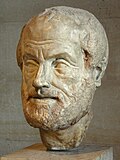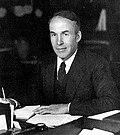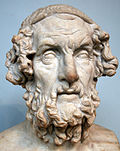Poetry
Poetry is a form of literature that uses aesthetic and rhythmic qualities of language to evoke meanings in addition to, or in place of, the prosaic ostensible meaning. Poetry has a long history, dating back to prehistorical times with the creation of hunting poetry in Africa, and panegyric and elegiac court poetry were developed extensively throughout the history of the empires of the Nile, Niger and Volta river valleys.
History[edit]
The oldest surviving epic poem is the Epic of Gilgamesh, from the 3rd millennium BC in Sumer (in Mesopotamia, now Iraq), which was written in cuneiform script on clay tablets and, later, papyrus. Other ancient epic poetry includes the Greek epics Iliad and Odyssey, the Old Iranian books the Avesta and the Gathas, and the Indian Sanskrit epics of Ramayana and Mahabharata.
Forms[edit]
There are many different forms of poetry, including the sonnet, haiku, ballad, and epic. Each form has its own structure and rules, such as the number of lines, the number of syllables in each line, and the rhyme scheme.
Themes[edit]
Poetry can cover a wide range of themes, from love and death to nature and time. These themes can be explored in many different ways, depending on the poet's personal perspective and the cultural context in which the poem was written.
Techniques[edit]
Poetic techniques include the use of rhythm, rhyme, alliteration, assonance, and onomatopoeia. These techniques can be used to create a particular mood or atmosphere, to convey a particular meaning, or to create a particular effect.
Criticism[edit]
Poetry criticism is the discussion, evaluation, and interpretation of poetry. It can be conducted by professional literary critics, by poets themselves, or by amateur readers.
See also[edit]
Ad. Transform your life with W8MD's Budget GLP-1 injections from $75


W8MD offers a medical weight loss program to lose weight in Philadelphia. Our physician-supervised medical weight loss provides:
- Weight loss injections in NYC (generic and brand names):
- Zepbound / Mounjaro, Wegovy / Ozempic, Saxenda
- Most insurances accepted or discounted self-pay rates. We will obtain insurance prior authorizations if needed.
- Generic GLP1 weight loss injections from $75 for the starting dose.
- Also offer prescription weight loss medications including Phentermine, Qsymia, Diethylpropion, Contrave etc.
NYC weight loss doctor appointmentsNYC weight loss doctor appointments
Start your NYC weight loss journey today at our NYC medical weight loss and Philadelphia medical weight loss clinics.
- Call 718-946-5500 to lose weight in NYC or for medical weight loss in Philadelphia 215-676-2334.
- Tags:NYC medical weight loss, Philadelphia lose weight Zepbound NYC, Budget GLP1 weight loss injections, Wegovy Philadelphia, Wegovy NYC, Philadelphia medical weight loss, Brookly weight loss and Wegovy NYC
|
WikiMD's Wellness Encyclopedia |
| Let Food Be Thy Medicine Medicine Thy Food - Hippocrates |
Medical Disclaimer: WikiMD is not a substitute for professional medical advice. The information on WikiMD is provided as an information resource only, may be incorrect, outdated or misleading, and is not to be used or relied on for any diagnostic or treatment purposes. Please consult your health care provider before making any healthcare decisions or for guidance about a specific medical condition. WikiMD expressly disclaims responsibility, and shall have no liability, for any damages, loss, injury, or liability whatsoever suffered as a result of your reliance on the information contained in this site. By visiting this site you agree to the foregoing terms and conditions, which may from time to time be changed or supplemented by WikiMD. If you do not agree to the foregoing terms and conditions, you should not enter or use this site. See full disclaimer.
Credits:Most images are courtesy of Wikimedia commons, and templates, categories Wikipedia, licensed under CC BY SA or similar.
Translate this page: - East Asian
中文,
日本,
한국어,
South Asian
हिन्दी,
தமிழ்,
తెలుగు,
Urdu,
ಕನ್ನಡ,
Southeast Asian
Indonesian,
Vietnamese,
Thai,
မြန်မာဘာသာ,
বাংলা
European
español,
Deutsch,
français,
Greek,
português do Brasil,
polski,
română,
русский,
Nederlands,
norsk,
svenska,
suomi,
Italian
Middle Eastern & African
عربى,
Turkish,
Persian,
Hebrew,
Afrikaans,
isiZulu,
Kiswahili,
Other
Bulgarian,
Hungarian,
Czech,
Swedish,
മലയാളം,
मराठी,
ਪੰਜਾਬੀ,
ગુજરાતી,
Portuguese,
Ukrainian














